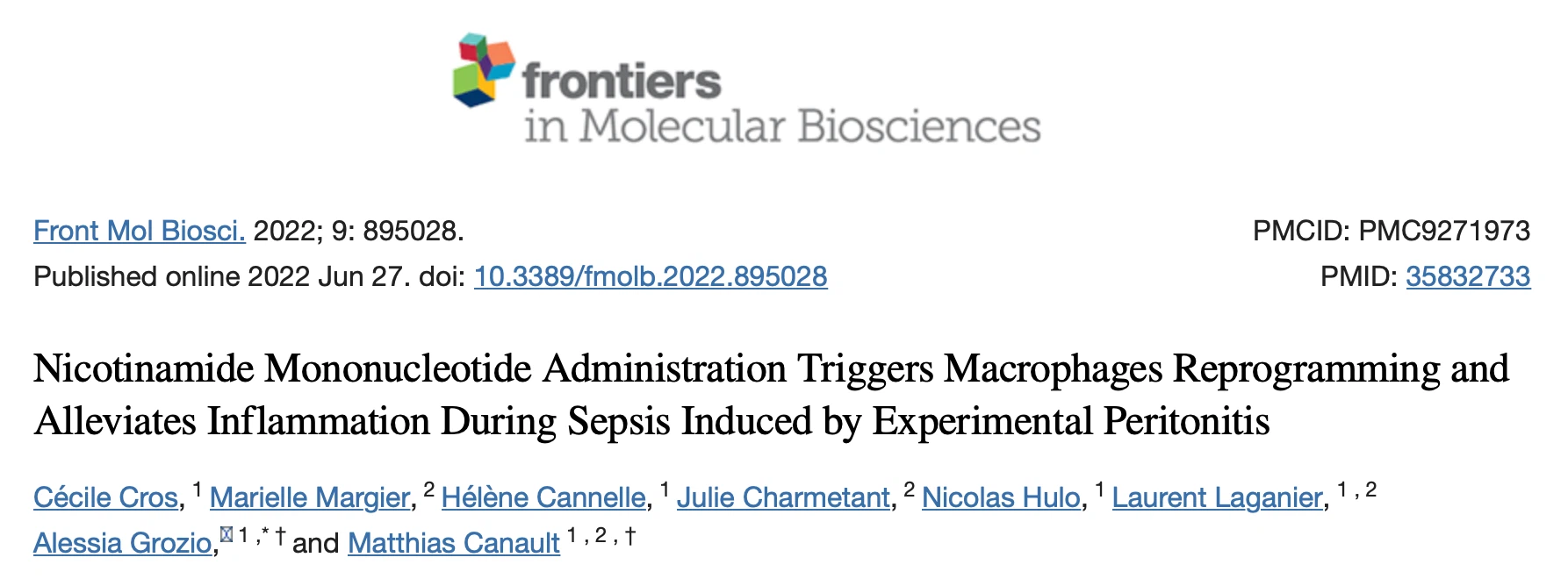
Dec 02, 2022 / Author: China Glutathione suppliers & NMN manufacturers
In 2022, researchers from Switzerland and France found that NMN can reduce peritonitis-induced sepsis and improve bacterial load and metabolic disorders. NMN is predicted to prevent clinical deterioration during sepsis and contribute to improved survival.

Peritonitis is mostly caused by bacterial infection, chemical stimulation or injury of the organs in the abdominal cavity. The infected person usually has abdominal pain, fever, nausea, vomiting and other symptoms. Bacteria in the abdominal cavity of patients with peritonitis multiply after entering the blood, which is very easy to cause sepsis. Sepsis is quite fatal. If measures are not taken in time, it can easily cause systemic poisoning, multiple organ failure and even death.
The high morbidity and mortality of peritonitis and its resulting sepsis are mainly due to uncontrolled systemic inflammation mediated by macrophages, and NAD+ is an important regulator of oxidative stress and immune inflammatory response. So, can increasing NAD+ levels reduce inflammation and improve peritonitis and sepsis? To confirm this conjecture, the researchers conducted experiments using NMN, the precursor of NAD+.
The researchers selected male mice aged 7-12 weeks, induced peritonitis in mice by cecal ligation and puncture (CLP), and divided them into NMN injection group and normal saline control group. In addition, additional mice were sham-operated (laparotomy without CLP) for a control study. It was found that peritonitis and sepsis consume a large amount of NAD+ (relevant metabolites are significantly increased), while NMN makes NAD+ levels rise, and brings improvements in survival rate, bacterial load, inflammation, metabolism and other aspects.
The survival rate of the mice in the NMN group was significantly higher than that of the control mice in saline. Due to the high mortality rate of peritonitis-induced sepsis, the average survival time of mice in the control group was only 48 hours, and the survival rate after 4 days was 12%, while the survival rate of mice in the NMN group was as high as 51% after 4 days.
There were also significant differences in body temperature. The body temperature of mice in the control group decreased significantly 2 hours after CLP, and dropped to the lowest value at 24 hours after operation, with an average drop of -6.07°C, while NMN alleviated the drop in body temperature of mice 6 hours after CLP, and at The body temperature returned to normal levels 24 hours after the operation.

Figure: There are significant differences in the survival rate (A) and body temperature (B) of mice in the NMN group and the control group
Since bacterial infection and proliferation are important causes of peritonitis and sepsis, the researchers measured the bacterial load in the blood of the mice: the bacterial load in the blood of the mice in the NMN group was significantly lower than that in the control group. In the antibacterial experiment in vitro, although NMN has inhibitory effect on some bacteria, the effect is limited. This means that NMN does not reduce bacterial load by directly inhibiting bacterial growth, but by stimulating the host response to infection.

Figure: Bacterial load was significantly reduced in the NMN group
In addition, the concentrations of 13 pro-inflammatory cytokines were significantly increased in mice receiving CLP, while two pro-inflammatory cytokines (CXCL10 and IL-6) were lower in the NMN group, showing that NMN can partially reduce inflammatory cytokines , reduce inflammation.
Sepsis can cause multiple organ failure leading to death, and the heart and lungs are two organs that are susceptible to sepsis, and the degree of their dysfunction is closely related to the patient's life. The researchers detected the expression of cardiopulmonary genes in experimental mice and found that the cardiopulmonary and immune-related pathways in the mice undergoing CLP were generally down-regulated, while NMN brought improvements by regulating gene expression.
Furthermore, sepsis is accompanied by energy and metabolic disturbances caused by mitochondrial dysfunction, on which NMN has a positive effect. The researchers confirmed the finding that NMN upregulated glucose metabolism and the tricarboxylic acid cycle in the lungs, and improved lipid metabolism in the heart and lungs. It shows that NMN helps to improve cardiopulmonary immune response and energy metabolism, and alleviate organ damage caused by sepsis.
Supplier Introduction: China glutathione supplier and NMN manufacturer GSHworld, the company mainly develops biotechnology and industrialization. As a global pioneer in enzymatic catalytic ATP regeneration technology, our company advocates green production and is committed to providing customers with better and more environmentally friendly products and services. Glutathione Manufacturer,NMN Factory,Citicoline Sodium supplier,China NMN manufacturers
PREVIOUS:NMN May Relieve Acute Pancreatitis
+86-755-23577295
+86 18718790084
Room 832, Building 12, Shenzhen Bay Science and Technology Ecological Park, Yuehai Street, Nanshan District, Shenzhen China